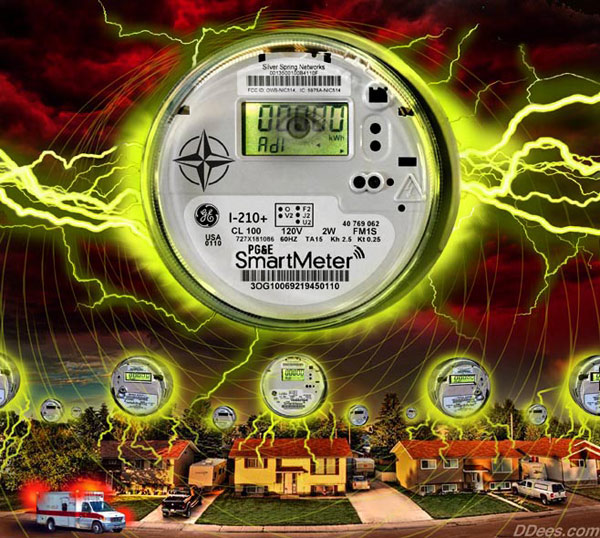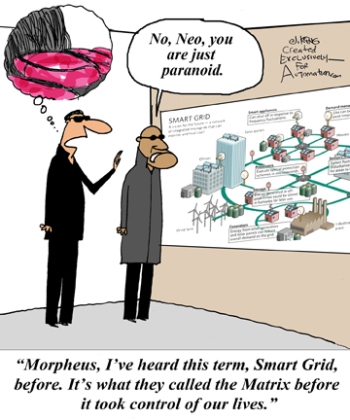Will Smart Meters change our habits as consumers?
In the UK, the government announced that they aim to supply every home by the year 2020 with a Smart Meter, which allows us ostensibly, to monitor how much energy we are using. The information recorded is relayed to the utility for billing and updating our usage data. It can measure all the energy we consume, whether it be electricity, water or gas.
We are told, by the government, that they are sophisticated, high tech devices, that can save on bills, by giving accurate readings, and estimating how much energy we are using. There is also information telling us that the Smart Meter in the long term will make it easier, quicker to switch suppliers and change their energy-usage habits.
Are these wireless digital utility meters, that broadcast our energy usage, a huge technological advance, or are they really a potential ”hornet’s nest”?
The meter’s two way communication facility is maintained by PMRF (RF) transmitters and receivers, in order to make it controllable and readable, remotely. Say the utility you are using in future decides you are using too much water for your showers, garden and washing machine, will it be asking you to use less?
Most people could see the impact of a Smart Meter as not only a worrying health threat, in spite of the government assurance, that there is no medical evidence to show they are unsafe, but also as an extremely invasive device that can control every aspect of our energy consumption. There are some larger ethical questions that are relative such as regulating our inalienable human need for water.
In the case of British Gas, the pressure group SMM has revealed after points raised to Ofgem, that they (British Gas), may be misleading their customers in their Charter. For instance, the failure to reference any health risks associated with the meter, even though they are designated as Class 2b carcinogens, by the WHO.
An Ofgem spokesman states in regards to British Gas,
“we have received their Charter and consider that some consumers may find it misleading. We will be asking them to seriously consider amendments to their Charter so it more accurately reflects that Smart Meters are not mandatory.”
So what are the long term implications of this technology?
If the Smart Meter is the prototype, and foundation, on which other wireless household appliances could use similar microwave frequencies, the possibilities are endless. One cannot deny, that this concept is open to misuse by governments, councils, and corporations, which could invade our privacy. Quite apart from the health implications of multiple microwave transmissions within our homes, every aspect of our daily lives will be open to being monitored. Is it time to stock up on candles, or a better idea, time for all of us to install solar power?
Jokes aside, there seem to be some rather more sinister aspects to Smart Meters, as was recently outlined in an article in the Guardian, by John Naughton. Apart from the obvious ones of the utility companies being aware of your energy consumption, if you fail to pay your bills, the utilities will be able to switch off your supply remotely,
“which means – and here’s the interesting bit – Kim Jong-un, the Chinese army or any number of unsavoury characters in the Middle East or Russia could do the same.”
In the same article Professor Ross Anderson, an expert on cyber-security, is quoted as saying,
“from the viewpoint of the cyber attacker- whether hostile government agency, a terrorist organisation or even a militant environmental group – the ideal attack on a target country is to interrupt its citizens’ electricity supply. This is the cyber equivalent of a nuclear strike.”
Smart Meter or Dumb Meter?
There appears to be little evidence to show us, that the Meter is as ‘smart’ as the utility companies propose. Firstly there are the health risks, as Daniel Hirsch, a nuclear scientist, says Smart Meter’s emit “100 times more radiation than cellphones.” Then there are the risks from hackers and terrorists as highlighted by the FBI who state that Smart Meters are so loose that hackers have easily been able to steal electricity.
Roger Helmer MEP, too, has quashed any notions that the consumer may have had about the meter being something we can benefit from. He said “I suspect that the benefits envisaged for consumers may prove illusory.” Ofgem estimates a reduction of 4% with a Smart Meter based on an average consumption of 3300 KWH and a bill of £500 a year, that’s roughly a saving of £20. Dumb or Smart?
Is this Smart Meter here to stay, with no apparent financial or practical benefits for us? Arthur 1989, argues that increasing returns lead to “lock-in” of mandatory technologies, preventing take-up of potentially superior ones, and that the technology that takes an early lead corners the market. He examines the circumstances and dynamics whereby the economy might become “locked-in” by ‘historical events’ to the dominance of an inferior technology.
Of course there is the other side of the argument, that maybe fear of the Smart Meter is symptomatic of our basic human suspicion towards any new technology, and that we are willing to surrender potential benefits by our need to protect our individual liberties. Adam Thierer discusses our ‘technopanic’ in his paper Technopanics, Threat Inflation, and the danger of an Information Technology Precautionary Principle. It’s an interesting analysis of our fear-based principles regarding technological change.
It seemed when 1984 came and went that George Orwell was another false prophet – maybe it was just his timing that was a little premature. This recent brainchild of technology is part of a larger Smart Grid framework agenda, where the government can have inroads into our privacy and freedom. As with any complex system, Brian Arthur shows us that the economy over time can be ‘locked-in’ to a technological route that is not necessarily efficient, and not able to predict from routine knowledge of supply and demand roles. Logical expectations about future technology choices can exacerbate the ‘lock-in’. In the case of the Smart Meter you could just say no and forget about it, but what if the government dictates that people must accept the meter and it becomes mandatory?


